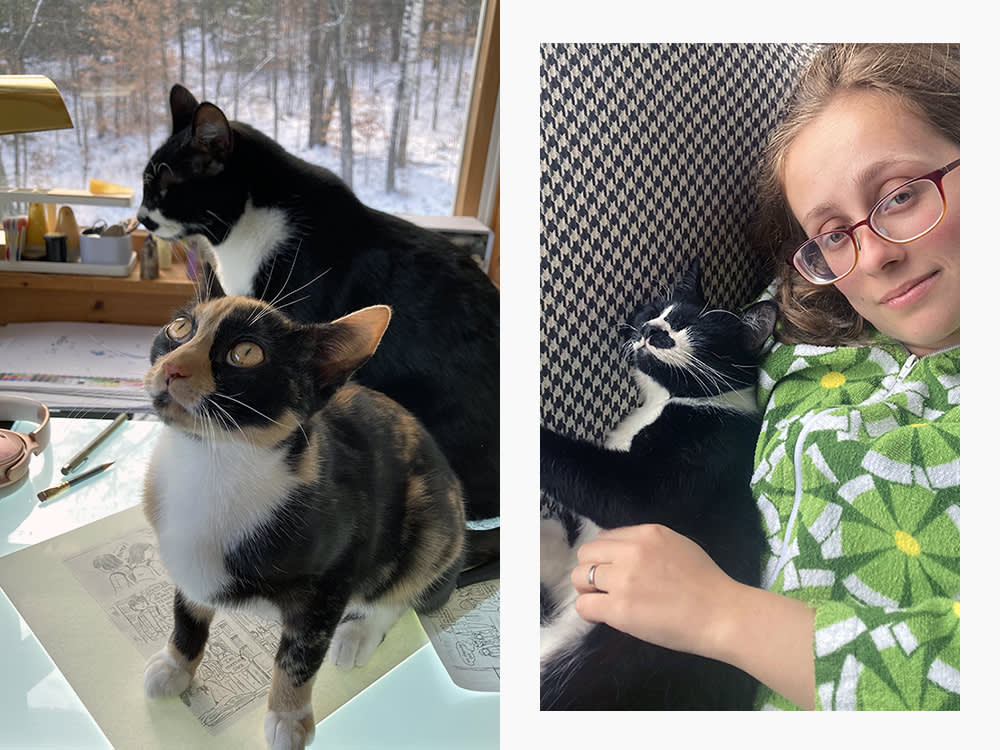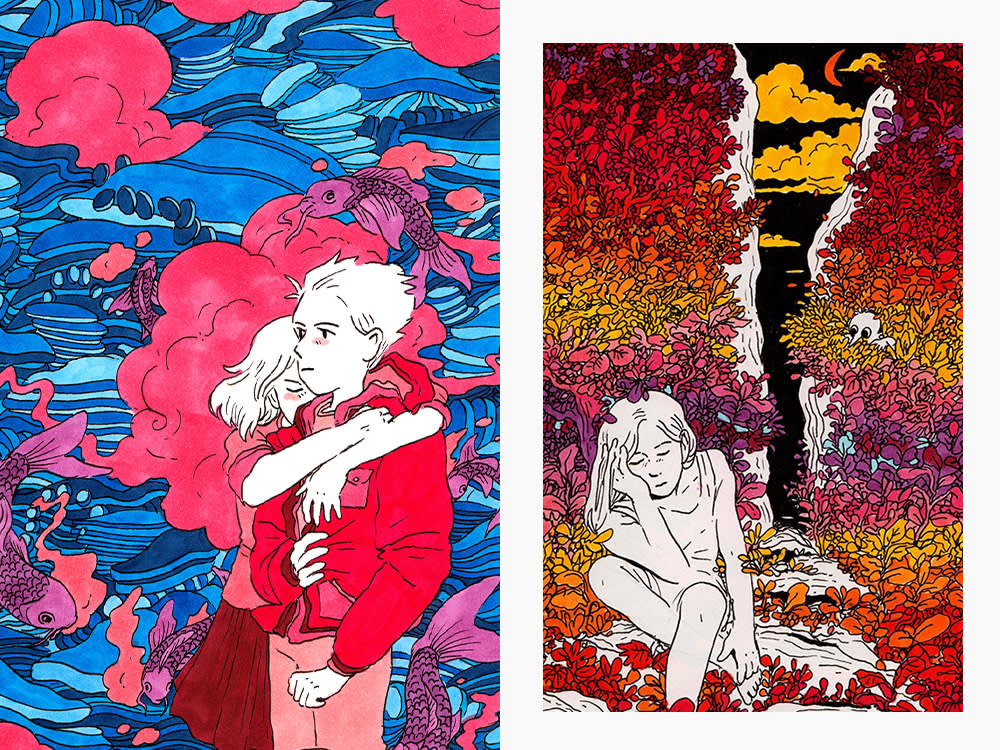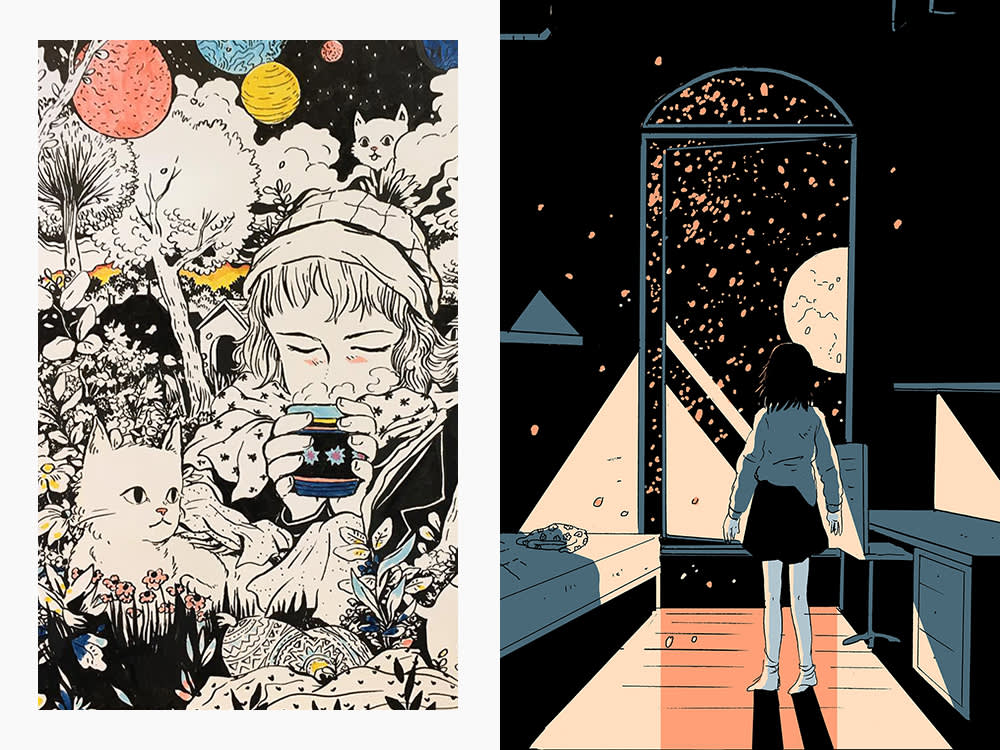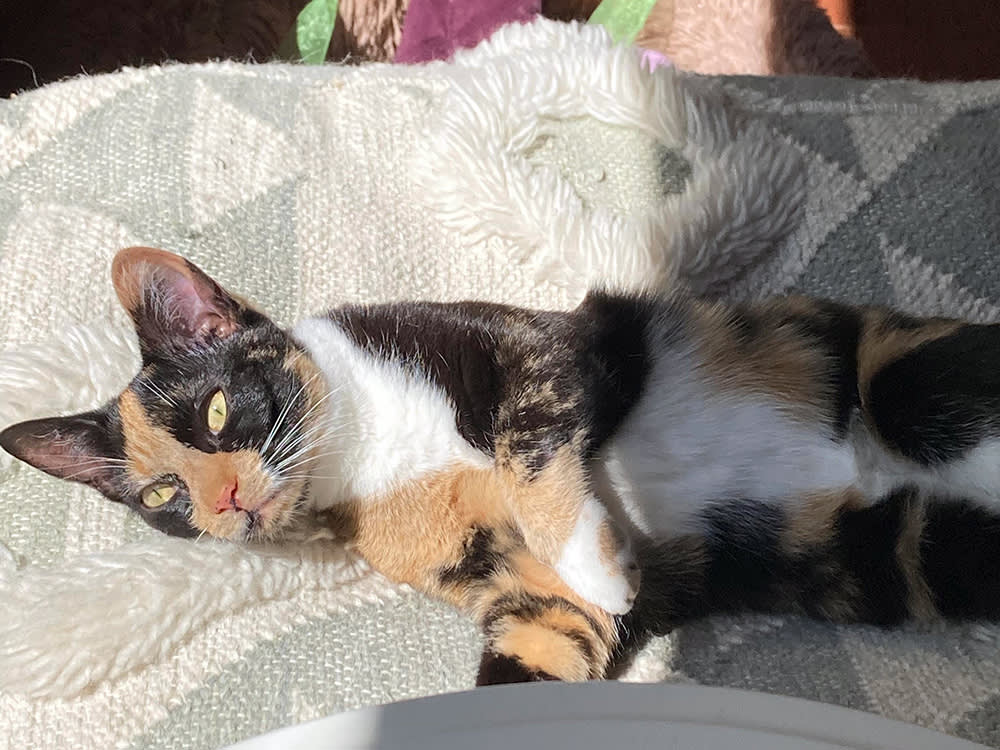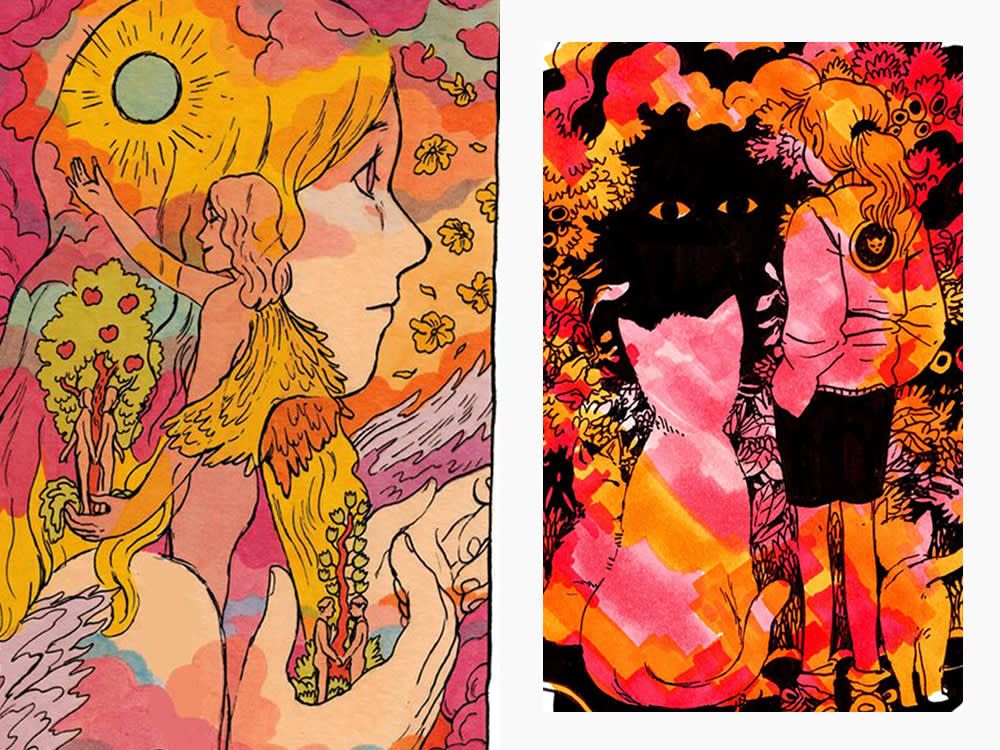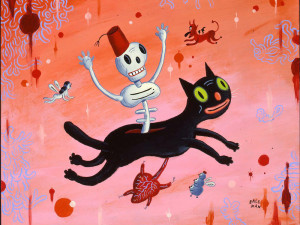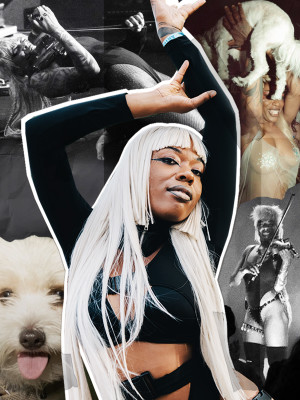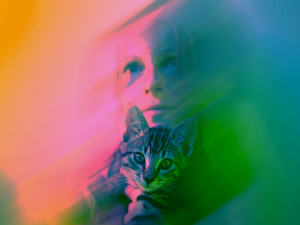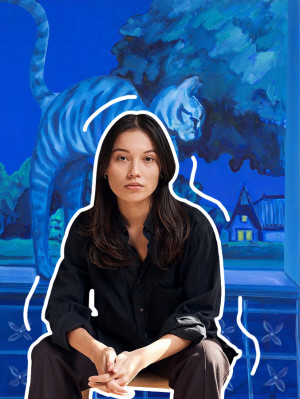Cartoonist Tillie Walden’s Cats Try to Destroy Her Life’s Work
But, in the end, they are the necessary force behind her art.
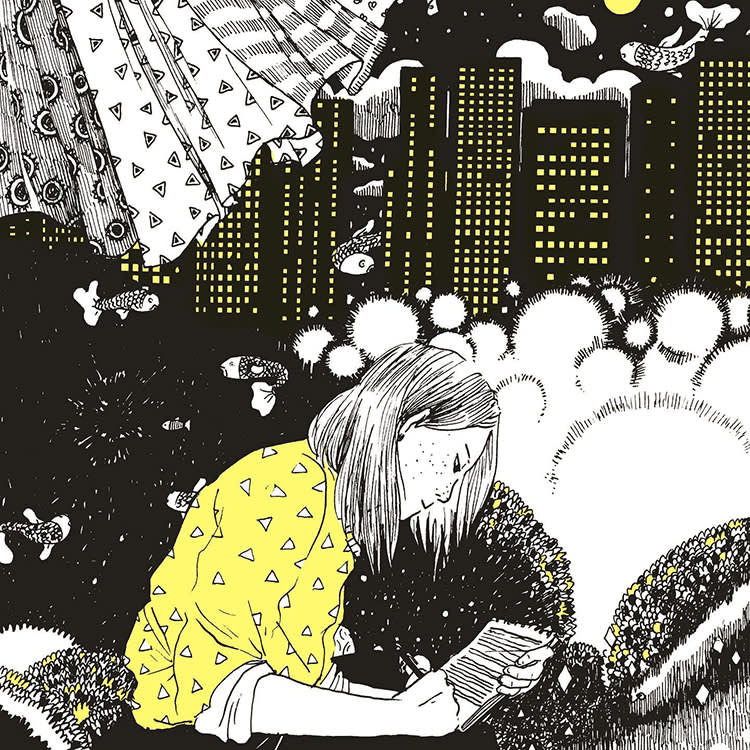
Share Article
As a comic-book creator-illustrator, Tillie Waldenopens in new tab possesses an exceptional ability to observe movement, behavior, and motivations. Her work is so compelling that Entertainment Weekly opens in new tab has named her as one of “the most essential graphic novelists of her generation.”
The 26-year-old has also won a pair of Eisner Awards — the comic’s equivalent of the National Book Award — for her graphic novels Spinningopens in new tab (2017), a moving memoir that explores LGBTQ+ identity, and Are You Listening? (2019), a powerful work of empathy infused with magical realism. When she’s not working on her own projects, Walden is helping to shape the minds of emerging talent as a professor at The Center for Cartoon Studiesopens in new tab, where her now-famous cats, Tatiana and Stanley, have been known to make appearances during class.
Kinship spoke with Walden, who lives in snowy Vermont with her wife, Emma Hunsingeropens in new tab, (best known for her New Yorker cartoonsopens in new tab), about everything from her cats’ attacks on her artwork to the undeniable healing power of animals. “I think about it constantly,” she says, kindly. “How every time I feel like we’re going through something hard or everything seems to be falling apart, having Stanley and Tatianna here with us is enormously helpful.”
What was it like raising Tatiana and Stanley as kittens?
They were just attracted to doing things that will result in their death. I remember Stanley trying to get in the washing machine, getting stuck behind the washing machine. And Stanley got stuck under a sink. I had to practically cut him out to get him out. And you know, Tatianna will climb anything in sight. Once, she ate Christmas lights. It was the plastic kind.

What are their personalities like now?
Stanley really is just a love bug. All he wants is to be in our arms, and he really does not like to be disrupted once he’s in our arms. We have to set him down really gently when we need to move. But then, sometimes, Tatianna gets jealous, and she jumps up. And not only do I have business meetings, I have talks that I give to classes. There can be 500 people watching me do something, and in that second a cat will decide to yell and jump on your lap and sniff the camera.
What’s a piece of advice you would give a new pet parent?
I hear other people talking about how a lot of the phases with animals don’t last forever. But it feels like it’s gonna last forever. You feel like your cat’s gonna be running around all night long keeping you awake. But they really do change, and they really do grow and find ways to mellow out. But it takes a lot of time. And it happens very incrementally.
There was a moment when I was holding Stanley at two months old, and my mom had come over, and I was just crying because I was like, “He will not stop trying to attack and eat everything.” But now he’s totally fine. I guess the biggest thing is really finding friends or anyone else you know who has a young animal, so you can talk about it. Even Reddit forums, Instagram — there [are] so many communities out there.
I want to hear about how Tatiana was saved from a hoarder — a lot of cats don’t survive that situation, especially small ones.
This couple had heard about this house, they showed up and just, like, pulled the cats out of the rubble, practically. Then they immediately took them to the vet because a lot of them were in a dire state. I don’t think Tatianna showed signs of distress, despite having sort of a rough start to life because the foster parents who rescued the cats did such a good job of taking care of them. Anytime I start to think about animals that aren’t well taken care of, just, it’s the most devastating thoughts. And the only way I can comfort myself is to just look at our cats and be like, “I’m gonna give you the best life I possibly can.”
What are the cats like when you’re working?
Once, Stanley decided to jump from his cat tree to the table and proceeded to knock every page of art — and the ink — off the table. Stanley has knocked over water. He actually destroyed my wife’s computer by knocking water all over it. And he also spilled something on a tarot deck I was making — I was hand-painting all the cards. But I was able to Photoshop it out. I’m prepared for that now: You always close the ink when you’re done. And they love sitting on different textures; as soon as I lay down a new sheet of paper, Stanley and Tatianna are both sitting on it.
So, we went to the store and got a bunch of felted bins. And whenever you’re drawing, you set them up right next to the piece of paper, and the bin is much more interesting to them. Of course, there’s some stuff I simply can’t do with them around. I can’t oil paint. Luckily, our studio is physically separate, and you have to go outside to get to it. My wife sometimes talks about trying to connect the studio to the house because there’s so much snow in the winter and trying to get over there can be frustrating. But I was like, “If we connect it, say goodbye to your watercolors.”
Do they ever end up being featured in your work?
I’ve never written a book that hasn’t had a cat as an integral character. Cats are insanely agile and fast. It’s beautiful. I still feel like I haven’t fully mastered drawing cats, and I’ve published, like, nine booksopens in new tab. I’m doing a Walking Dead comic right now, and lo and behold, a character just happens to find a kitten who is a tuxedo cat and looks a little bit like Stanley.
In the book I did called Are You Listening? the entire story revolves around two characters who find a cat at a gas station. Even though it’s a very dark and serious book, the cat has powers, the ability to tap into your emotions. The whole story is about these two women going through some trauma and different relationships, but the cat is the way they access their healing.
You’re very open about being a part of and supporting the LGBTQ+ community. Wouldn’t it be great if part of the support process included giving people a comfort animal?
It’s really interesting; on top of writing and drawing books, I also teach, and a lot of our student body has been through hardship and different traumas. A lot of them have service animals, and it’s become a really integral part [teaching], learning about their different animals. We all become very attached to each other's pets. I know the names of my students’ pets, and they know the names of my pets. We have a tradition where we draw each other for the holidays, and when students draw me, they include Stanley and Tatiana. It’s just a wider part of acceptance. And our animals are such a big part of that.
It’s interesting how people tend to characterize cats as being aloof and not necessarily healing.
They are social creatures. Does that mean they always want to be in your arms? No. Like people, they have boundaries. But they’re so, so, so social, and they’re heartbroken when we’re not with them. But luckily, I think it’s great that they have each other. That’s one of the reasons we adopted Tatiana, because Stan was showing signs of only-child syndrome. I was locked down with him [during the pandemic]. He really thought that a normal existence is like, “Every minute of every day, I’m with my mom.” And once we got a second cat, Stanley stopped biting and scratching when he got upset.
What’s next for you?
I have a book coming out called Junior High that’s written by Tegan and Sara.
Oh, we just interviewed Tegan!
Yeah, it’s about their childhood in Calgary, discovering music in their identity. It’s really an uplifting, sweet read. I certainly enjoyed drawing it and have a cat in it, of course. I do wish the cat had a larger role in the story, but I will do my best!
Anything else we should look out for?
I’ll mention my picture book, actually, that my wife and I did together. It’s a picture book called My Parents Won't Stop Talkingopens in new tab. And it is literally just about parents who will [not] stop talking. And it has two moms in the story, but it’s not really about that. It really is just about what it feels like to wait when you’re a kid. And there is a page in which the main character, Molly, is so bored that she decides to count the cats that she sees, so there is animal representation, of course.

Nisha Gopalan
Nisha Gopalan has been a writer/editor for The New York Times, New York magazine, Entertainment Weekly, Variety, The Hollywood Reporter, and NYLON magazines. She currently resides in Los Angeles.
Related articles
![Emma Allen wearing glasses and blue jacket standing in front of her desk with full bookshelves above it]()
Emma Allen’s Cat Is Laughing at You
The New Yorker cartoon editor’s assistant is a massive, blood-thirsty, perfect furball.
![Painting of skeleton riding cat with heart below]()
Artist Gary Baseman on Late Cat Blackie & New Kitten Bosko
“Blackie was a friend and a collaborator. I never saw him as a pet and I don’t see Bosko as one either — they are family members.”
![sudan archives collage]()
Musician Sudan Archives Had a Banner 2022, Thanks to Her Dog Junko
With a special nod to Barack Obama, too.
![An artistic pink and green digitally altered portrait of Kaitlyn Aurelia Smith holding her cat]()
Kaitlyn Aurelia Smith’s Transcendent Music Is Inspired By the Language of Cats
Her serendipitous cat adoption story is just as otherworldly.
![A portrait of the artist Bambou Gili, a woman with long dark hair wearing a black dress shirt and dark brown trousers sitting with one of her paintings of a cat in all blue behind her and white outlines around her figure]()
Bambou Gili’s Paintings Are For Cool Cats Who Thrive in the Midnight Shadows
The dreamy hues of the visual artist’s work reflect the magic found in quiet moments. Something kitties appreciate, too.
